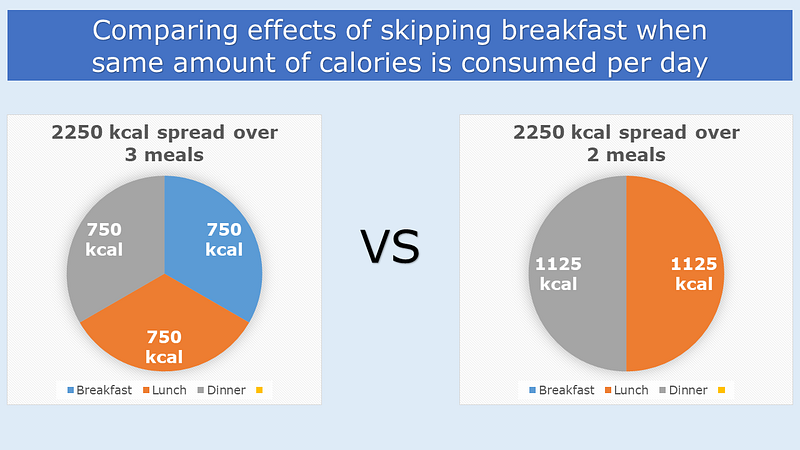What Happens to Your Blood Sugar When You Skip Breakfast?
Written on
Chapter 1: The Impact of Skipping Breakfast on Blood Sugar
In recent investigations into the effects of skipping breakfast, a phenomenon known as the “second-meal effect” has surfaced. This term, often overlooked by advocates of intermittent fasting, describes how skipping breakfast can lead to elevated blood glucose levels after lunch.
To address this issue, I began to explore what a healthier lunch might consist of in order to counteract the blood sugar spikes that follow skipping breakfast. This article will delve into:
- How skipping breakfast affects post-lunch glucose levels.
- The reasons behind these increased glucose levels.
- What constitutes a nutritious lunch that can help mitigate these effects.
Section 1.1: Understanding the Glucose Spike
Research indicates that individuals who skip breakfast often consume more calories during lunch. A clinical trial conducted in Japan revealed that participants who consumed their total daily calories across two meals experienced higher blood glucose levels post-lunch compared to those who spread their intake over three meals.
After a week of skipping breakfast, participants showed some adaptation; their post-lunch glucose levels were lower. However, the overall blood glucose levels throughout the day remained significantly elevated. This suggests that while the body may adjust to a new eating pattern, it doesn't necessarily manage blood glucose effectively over a full 24-hour period.

Section 1.2: The Glucose Challenge
It's important to note that not all individuals who skip breakfast eat more during lunch. In the context of intermittent fasting, some people deliberately choose to forego breakfast in hopes of creating a calorie deficit for weight loss.
In another study, participants consumed the same number of calories at lunch, regardless of whether they had breakfast. Surprisingly, those who skipped breakfast still exhibited a significant glucose spike after lunch, indicating that the act of skipping breakfast itself plays a crucial role in glucose regulation.
Chapter 2: How Breakfast Skipping Influences Insulin Response
When we wake up, our bodies are essentially in a fasting state. During this time, two key biological processes occur:
- The liver releases stored glucose to nourish vital organs.
- Body fat breaks down into free fatty acids, which serve as an alternative energy source.
After a morning without food, the levels of free fatty acids peak right before lunch. When calories are finally consumed, insulin is released to counterbalance the fasting state. However, there's often a delay in insulin response—around 30 minutes—post-lunch. This lag, combined with the need to first clear free fatty acids before utilizing glucose, results in prolonged elevated blood glucose levels.
Why Skipping Breakfast Sabotages Your Health | Dr. Mark Hyman discusses how morning fasting can disrupt insulin production and lead to health issues.
Section 2.1: Recommendations for a Healthier Lunch
Italian researchers have suggested an effective strategy to reduce post-lunch glucose spikes: consume a low-carb snack about 30 minutes before lunch. A snack rich in protein and fats can enhance insulin sensitivity and assist the body in managing blood sugar levels. Ideal pre-lunch snacks may include protein bars, yogurt, full-fat milk, cheese, or eggs.
To minimize the overall elevation of blood glucose throughout the day, it is generally advised to avoid high-carb meals. Instead, focus on incorporating more vegetables (fiber) along with sufficient protein and fats in your lunch and dinner. However, if you're concerned about your blood sugar levels, consider having breakfast.
I Stopped Eating Breakfast For Two Weeks And I'm Never Doing It Again - This video explores the consequences of skipping breakfast and highlights the importance of morning meals.
Three Key Takeaways
- If you believe that skipping breakfast is beneficial but consume a high-carb lunch, you may be misapplying the principles of intermittent fasting.
- Prioritize the right food choices before honing in on precise eating schedules.
- Elevated post-lunch blood glucose levels after skipping breakfast may complicate glucose management for those with diabetes.
Final Tip: If you experience difficulty concentrating or feel mentally foggy, it may be a sign that your post-lunch blood glucose levels are too high.
